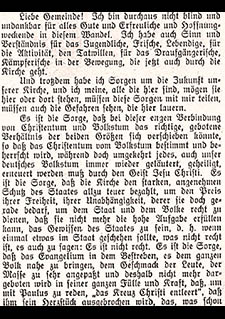Early Disillusionment and Disheartenment
Many, especially older Protestant pastors, who held German national views and lamented the loss of the German Empire, initially welcomed Hitler’s assumption of power on January 30, 1933, which was hailed as a “national revolution”.
Nonetheless, disillusionment and disheartenment started spreading among more than a few pastors relatively soon as they grasped that the National Socialists’ urgently desired to cast off their right-wing conservative allies, who had helped them to power, and did not share their goals of a Christian monarchy and order of estates at all.
A telling example of swiftly disappointed initial enthusiasm and hope is furnished by Otto Keller (1864–1946), a pastor in Koblenz. When his district synod unanimously voted him superintendent of the Koblenz church district for a third term of office in May of 1933, he took advantage of the opportunity to enthusiastically express his approval of the new government: As German and as Protestant Christians, as children of our Fatherland and as members of our church we joyfully welcome the emergence, the victory of this national awakening and thank God for it [...].
Keller became so disillusioned by developments in politics and the church after just four months that he resigned unexpectedly. In his farewell sermon on October 8, 1933, he remarkably not only expressed concern about the church’s independence but also warned that the church must be in the position and have the freedom to point out the state’s violations of the law publicly.
Specifically, he said, I am worried about our church’s future […] It is the worry that given this close relationship between Christianity and Volkstum the right, proper relationship of both entities might shift so that Christianity is dictated and controlled by Volkstum, while, on the contrary, every, even our German Volkstum must be purified, sanctified, renewed by the spirit of Jesus Christ again and again. It is the worry that the church will pay far too high a price for the strong, comforting protection of the state, the price of its freedom, its independence, which it needs now of course in order to serve the state and the people rightly, that it will no longer be able to fulfill its great mission of being the conscience of the state, i.e. if one day something should happen in the state, which is not right, to also say: It is not right.
Source / title
- Evangelisches Sonntagsblatt für Koblenz und Umgebung No. 43, p. 338 ©AEKR Boppard

